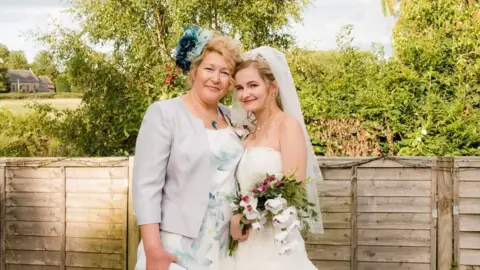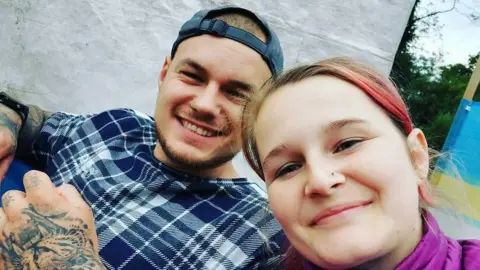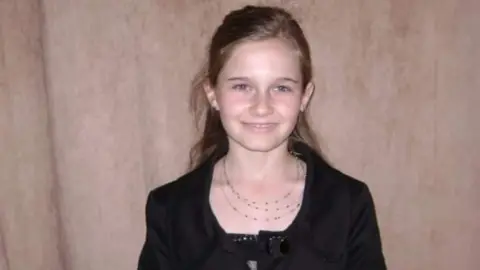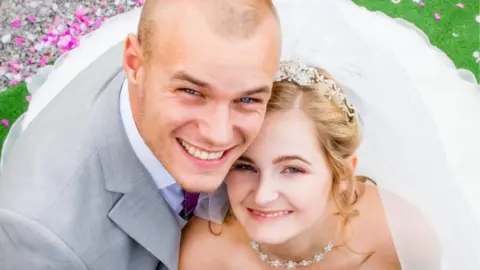Somerset woman raises awareness of brain tumour symptoms
 FAMILY HANDOUT
FAMILY HANDOUTA woman says "the whole world crashed beneath" her when she discovered she had been living with a misdiagnosed brain tumour for 15 years.
Natasha Tims, 30, from Chard in Somerset experienced delayed puberty and significant limited growth as a child because of the tumour.
Doctors believed she had Langerhans' cell histiocytosis (LCH), before being diagnosed with a gem cell tumour.
Ms Tims said doctors told her they were surprised "that I'm still here today".
Supporting the Better Safe than Tumour campaign by the Brain Tumour charity, she said she wanted to help save lives by raising more awareness of the common symptoms and possible signs of tumours.
 FAMILY HANDOUT
FAMILY HANDOUT"We all know so much about other cancer types but not this one and that needs to change.
"I would have been able to get help more quickly if I had known what was happening to me," she added.

Common brain tumour symptoms:
In adults:
- Persistent or severe headaches which may be worse in the morning
- Changes to vision including blurs and double vision
- Tiredness
- Nausea
- Speech difficulties and seizures
In children:
- Symptoms may also include balance, co-ordination or walking problems,
- Loss of taste and smell
- Abnormal head position
- Regular sickness, especially in the morning
- And excessive thirst.
Source: The Brain Tumour Charity

Ms Tims' mother Claire Gould said she felt like a "neurotic mother" after several trips to the GP, concerned about her then 4ft (1.21m), four stone (25kg), 15-year-old daughter's delayed height but doctors said there was nothing to worry about.
"I kept thinking to myself - there is something wrong with my child."
Ms Gould said things finally came to a head when her daughter fell off a climbing frame in the back garden and a nurse questioned her height.
"I wanted to stand up and go hallelujah," Ms Gould added.
 FAMILY HANDOUT
FAMILY HANDOUTMs Tims was referred to a endocrinologist - someone qualified to treat and diagnose conditions such as diabetes, some cancers and growth issues - and she was misdiagnosed with Langerhans' cell histiocytosis (LCH), a rare condition that affects the pituitary gland, a small, pea-sized gland located at the base of the brain.
"They basically said it was a child's cancer. It will never change," Ms Tims said.
Petrified, she asked herself "is it going to kill me at 15?".
Undergoing multiple blood tests and MRI scans following her diagnosis, she said she discovered a couple of years later that her tumour had grown but doctors, again, thought they would "just keep an eye on me".
 FAMILY HANDOUT
FAMILY HANDOUTHowever, after scans in 2018, 2019, 2020 and 2022 showed even more growth, something which doctors said was completely out of character for LCH, they decided to investigate further.
"I was absolutely terrified", Ms Tims added.
Earlier this year, after having headaches and eye pain, she learned her earlier diagnosis was wrong, and instead had been living with a rare germ cell brain tumour, a typically fast-growing tumour often located near the pituitary gland, which causes headaches and sickness.
Ms Tims said: "The headaches were so painful and made me feel sick.
"I had no energy so I couldn't go out - I stayed in bed all day and even walking to the bathroom was too much effort.
"We like to think there's nothing wrong at all."
"You never think it's going to be you," she added.

Follow BBC West on Facebook, Twitter and Instagram. Send your story ideas to: [email protected]
